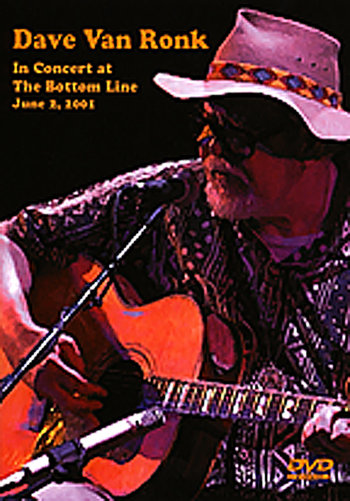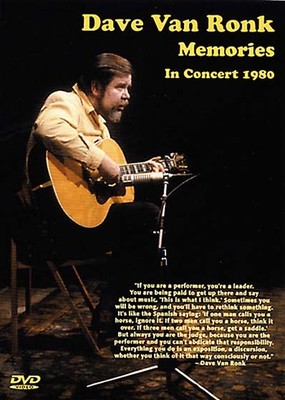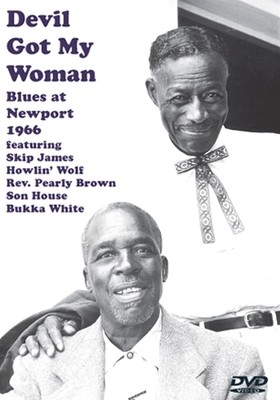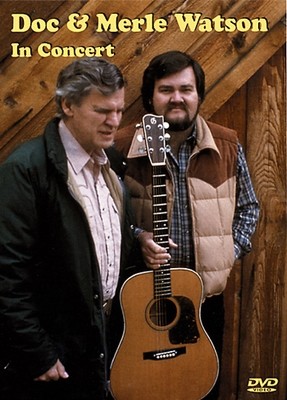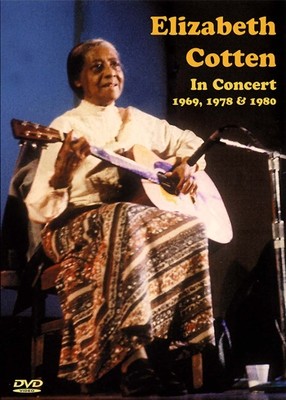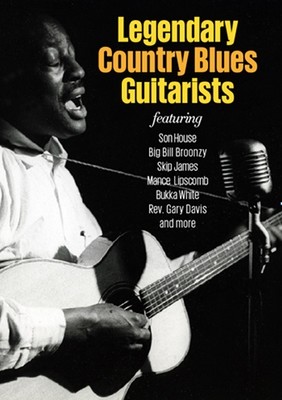
Dave Van Ronk at The Bottom Line
Few folk or blues enthusiasts need to be introduced to Dave Van Ronk, the extraordinary singer and guitarist. His name is inextricably linked, first and foremost, to the folk music scene in New York City's Greenwich Village in the 1960s. He played with and knew virtually everyone of musical significance in that decade. Familiarly known as "The Mayor of MacDougal Street," Van Ronk presided over an apartment that served as hangout pad/salon to peers like Bob Dylan, Odetta, Tom Paxton and Peter Yarrow, and a virtual graduate school to the next generation of guitarists, some of whom, like Christine Lavin, achieved broad popularity in their own right.
Dave Van Ronk played the sort of music he liked, with small regard for the boundaries that normally separate jazz and blues and country and folk. He proved in practice that those distinctions don't mean very much. His performances were stripped down to the essentials: emotional and musical honesty. He was a unique individual and musical figure. An engaging raconteur and gourmet cook, he enjoyed sipping wine and spinning philosophical tales and aphorisms deep into the night. "Honesty is the cruelest game of all," he once observed, "Because not only can you hurt someone -- and hurt them to the bone -- you can feel self-righteous about it at the same time."
In the Spring of 2001 Dave asked Stefan Grossman to organize the filming of his New York City Bottom Line performance. Eight months later Dave passed away. He was sixty-five years old.
Titles include: Down South Blues, You've Been A Good Old Wagon, Nobody Knows You When You're Down & Out, One Meatball, Don't You Leave Me Here, Jelly, Jelly, Somebody Else, Not Me, Sportin' Life, Come Back Baby, Sometime, Did You Hear John Hurt, Buckets Of Rain, St. James' Infirmary and Mamie's Blues
Bonus tracks: Dave teaches Green, Green Rocky Road and Cocaine Blues
Running Time: 84 minutes
Review: The Tin Can Bended... And The Story Ended. Many of the points made in the review of this DVD were made in a 2007 review of Dave Van Ronk's last CD "and the tin can bended, and the story ended." This DVD is, in many ways, a video extension of that work and thus the remarks there apply here as well.
Although this space is mainly dedicated to reviewing political books and commenting on past and current political issues literary output is hardly the only form of political creation. Occasionally in the history of the American and international left, musicians, artists and playwrights have given voice or provided visual reminders to the face of political struggle. With that thought in mind, every once in a while I will use this space to review those kinds of political expression.
My musical tastes were formed, as were many of those of the generation of 1968, by `Rock and Roll' music exemplified by the Rolling Stones and Beatles and by the blues revival, both Delta and Chicago style. However, those forms as much as they gave pleasure were only marginally political at best. In short, these were entertainers performing material that spoke to us. In the most general sense that is all one should expect of a performer. Thus, for the most part that music need not be reviewed here. Those who thought that a new musical sensibility laid the foundations for a cultural or political revolution have long ago been proven wrong.
That said, in the early 1960's there nevertheless was another form of musical sensibility that was directly tied to radical political expression- the folk revival. This entailed a search for roots and relevancy in musical expression. While not all forms of folk music lent themselves to radical politics it is hard to see the 1960's cultural rebellion without giving a nod to such figures as Dave Van Ronk, the early Bob Dylan, Utah Phillips, Joan Baez, Pete Seeger, Woody Guthrie and others. Whatever entertainment value these performers provided they also spoke to and prodded our political development. They did have a message and an agenda and we responded as such. That these musicians' respective agendas proved inadequate and/or short-lived does not negate their affect on the times.
When I first heard folk music in my youth I felt unsure about whether I liked it or not. As least against my strong feelings about the Rolling Stones and my favorite blues artists such as Howling Wolf and Elmore James. Then on some late night radio folk show here in Boston I heard Dave Van Ronk singing `Come All You Fair and Tender Ladies' and that was it. That old-time gravelly voice (even though I found out later that he was relatively young at that time) still commands my attention in the same way.
The last time I saw Dave Van Ronk perform after not seeing him for a fairly long period of time was not a particularly good night as he was pretty sick by that time. Moreover, his politics seemed to have crumbled over time from that of the hardened Trotskyist of his youth going out to slay the benighted Stalinists for the soul of the working class. His dedication to leftist politics, as testified to by those who knew him like Tom Paxton, was well known and passionate. Although no one asks a musical performer to wear politics on his or her sleeves as a litmus test, given Dave Van Ronk's status as a prime historian/activist of the folk revival of the 1960's, this was disconcerting.
That folk scene, of which Dave was a central and guiding figure not fully recognized outside a small circle to this day, was not only defined by the search for root music and relevancy but by large political concerns such as civil rights, the struggle against war, and the need for social justice. Some of it obviously was motivated as well as simply a flat out need to make our own 'mark' on the world. Dave was hardly the first person from this period to lose his political compass in the struggle against injustice. I say this with sadness in his case but I will always carry that memory of that late night radio experience in my head. That said, please listen to this man reach under a song. You will not forget it either.
As for the particular work here done at the Bottom Line in 2001. Naturally for a folk historian, and for Dave Van Ronk as a personality, there are the very informative, interesting and necessary tidbits about his early days in the late 1950s and early 1960s as "Mayor" of McDougall Street in New York's Greenwich Village. As for the music, many of the selections here were on the CD as well. Start from old classic blues/jazz tunes like Bessie Smith's "You've Been A Good Old Wagon" and Josh White's (who gets a fair share of accolades here, and rightly so) "One Meatball" to "Nobody Knows You When You're Down and Out" and "Saint James Infirmary." Paying tribute to the 1960's folk revival with friend Tom Paxton's "Did You Hear John Hurt?" and, to my ear, the definitive version of Bob Dylan's "Buckets Of Rain." These are the standouts but the whole production, as always with a Stefan Grossman effort, is well worth an hour and a half of your time. – Alfred Johnson/Amazon Customer Review
